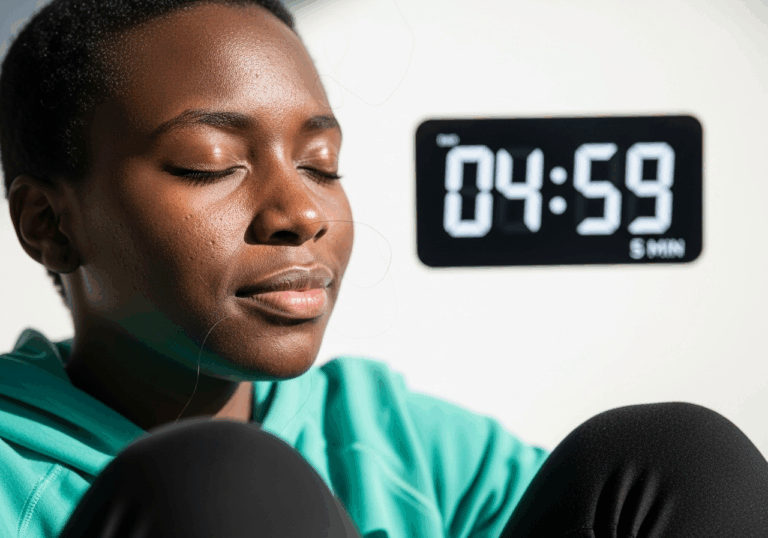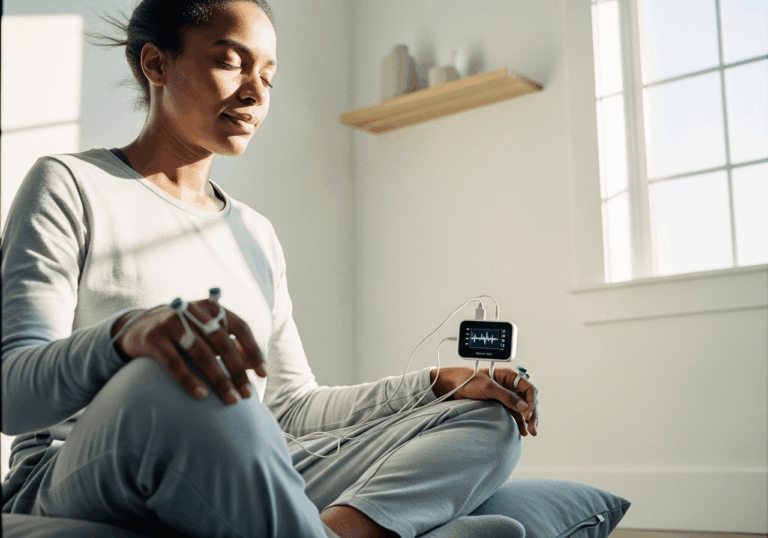Science-Backed Tips
HRV Biofeedback Reduces Stress in Healthcare Workers
20% decrease in perceived stress after 5 sessions.
📊 Did you know?
💡 Why It Matters
1️⃣
Reducing perceived stress by ~20% can enhance overall mental health and job performance.
2️⃣
Improved HRV markers indicate better physiological resilience, which is crucial for frontline workers.
3️⃣
Lower chronic stress levels can lead to decreased burnout rates among healthcare professionals.
✅ Try These Micro-Tips
🎯
Engage in HRV biofeedback sessions for 20 minutes weekly.
🎯
Practice deep breathing exercises for 10 minutes daily to complement HRV training.
🎯
Incorporate mindfulness meditation for at least 15 minutes each day.
🎯
Maintain a regular sleep schedule to support overall stress management.
📚 The study
The objective was clear: to assess how HRVB could reduce stress levels in those who are often at the forefront of healthcare challenges.
Over the course of five weekly sessions, 21 participants engaged in this innovative approach, and the outcomes were remarkable.
Participants reported a reduction in perceived stress by approximately 20%, a significant achievement in the high-pressure environment of healthcare.
Additionally, key heart rate variability markers, specifically SDNN and the LF/HF ratio, showed substantial improvement, indicating enhanced physiological resilience.
This stabilization of physiological responses is crucial as it supports not only mood but overall wellbeing, which is vital for maintaining the mental health of healthcare professionals.
The implications of these findings are profound; reducing perceived stress can lead to enhanced job performance and lower burnout rates among healthcare workers.
As the demands on frontline workers continue to escalate, integrating HRVB into their routine could be a game-changer, fostering a healthier and more resilient workforce.
❓ Frequently Asked Questions ❓
Learn more
What is HRV biofeedback?
HRV biofeedback is a technique that helps individuals learn to control their heart rate variability through breathing exercises and mindfulness. It aims to improve physiological resilience and reduce stress levels.
How does HRV biofeedback reduce stress?
HRV biofeedback reduces stress by training individuals to regulate their autonomic nervous system, leading to improved heart rate variability. This process helps lower perceived stress scores and enhances overall well-being.
What were the results of the HRV biofeedback study on healthcare workers?
The study found that perceived stress scores among healthcare workers decreased by approximately 20% after five weekly HRV biofeedback sessions. Additionally, significant improvements were observed in HRV markers such as SDNN and the LF/HF ratio.
How long should HRV biofeedback sessions last?
HRV biofeedback sessions should last about 20 minutes each week for optimal results. Consistent practice is key to achieving the desired stress reduction and physiological improvements.
What additional practices can complement HRV biofeedback?
Complementary practices include daily deep breathing exercises for 10 minutes and mindfulness meditation for at least 15 minutes. These activities can enhance the effects of HRV biofeedback and further reduce stress.
Why is improving HRV markers important for healthcare workers?
Improving HRV markers indicates better physiological resilience, which is crucial for healthcare workers facing high-stress environments. Enhanced HRV can lead to lower burnout rates and improved job performance.
How does reduced perceived stress impact mental health?
Reducing perceived stress by around 20% can significantly enhance overall mental health and well-being. Lower stress levels contribute to improved mood and greater job satisfaction.
What is the significance of the LF/HF ratio in HRV?
The LF/HF ratio is an important HRV marker that reflects the balance between sympathetic and parasympathetic nervous system activity. An improved LF/HF ratio indicates better stress management and physiological stability.
How can healthcare workers maintain a regular sleep schedule?
Healthcare workers can maintain a regular sleep schedule by going to bed and waking up at the same time each day, even on weekends. Prioritizing sleep hygiene, such as creating a restful environment, can also support better sleep patterns.
What is the overall goal of HRV biofeedback for healthcare professionals?
The overall goal of HRV biofeedback for healthcare professionals is to reduce chronic stress and enhance mental health. By stabilizing physiological responses, it aims to improve mood and job performance in high-pressure environments.





